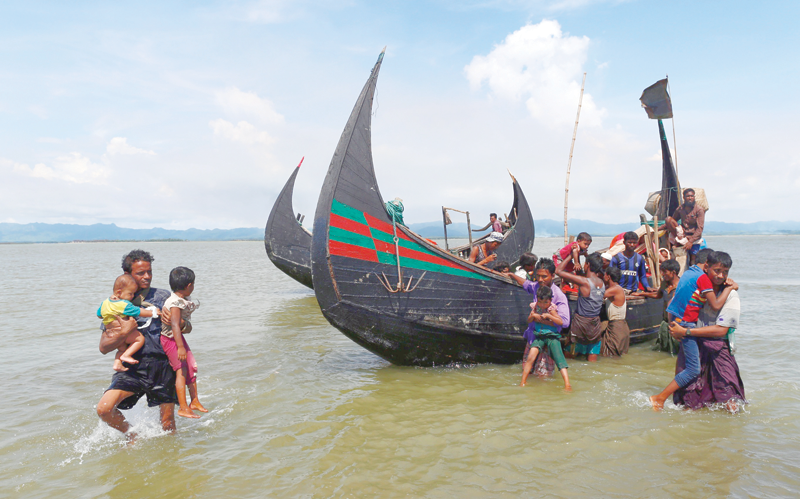

Cox’s Bazar, Bangladesh: Bangladeshi troops will deliver aid to desperate Rohingya refugees massed in Cox’s Bazar, authorities said on Friday, as fresh satellite images lent weight to allegations of a “scorched earth” campaign by Myanmar’s army to drive out the Muslim minority.
The relief effort for the estimated 391,000 Rohingya who have arrived at the border town in the last three weeks has been ad hoc and plagued by disorganisation as local aid workers are overwhelmed by the human tide.
With fears mounting that those in most need are not receiving basic aid — despite handouts by local volunteers — Bangladesh’s Prime Minister Sheikh Hasina said the army would be deployed to distribute aid sent by donor nations.
Lieutenant Colonel Rashidul Hasan on Friday said the orders had reached the crisis zone.
“We’ve got the directive that the army would receive relief materials sent by foreign nations at the airport and take it to Cox’s Bazar,” he said.
It was not immediately clear how quickly food and medicine would reach the refugees, many of whom are huddled on roadsides and patches of land.
But the World Health Organization and Unicef said they would launch vaccination campaigns on Saturday against measles, rubella and polio, targeting 150,000 newly arrived children.
Unicef spokeswoman Marixie Mercado said they were also screening children for malnutrition.
Last week, there were more than “1,100 unaccompanied and separated children, and we estimate that those numbers will rise sharply”, she added.
Around one third of Myanmar’s Rohingya population have fled northern Rakhine state for Bangladesh since August 25, when raids by Rohingya militants triggered the massive military campaign.
The United Nations has warned that the rest of the population may soon follow, deepening the humanitarian crisis unfolding in Bangladesh where some 10,000 refugees are arriving daily.
Myanmar faced renewed pressure on Friday as fresh satellite images emerged of scorched villages across Rakhine state, fuelling accusations the military is systematically driving out Rohingya Muslims in what the UN says is an ethnic cleansing campaign.
Human Rights Watch said 62 villages in the Rohingya-majority area have been targeted by arson attacks, with more than half showing “extensive building destruction”.
Amnesty International also released images of dozens of razed communities, alleging Myanmar’s security forces have led “systematic” clearances of Rohingya Muslim settlements.
“Rakhine state is on fire,” said Olof Blomqvist, a researcher with Amnesty International, in a “clear campaign of ethnic cleansing by the Myanmar security forces”.
Testimony collected by AFP in the Bangladesh refugee camps since the start of the crisis backs up allegations by rights groups that Myanmar’s army has been systematically burning Rohingya villages.
Somira, 29, a Rohingya refugee who uses one name, said in Cox’s Bazaar that she passed dozens of burning villages during her arduous trek through flooded fields and jungle to Bangladesh.
“I saw villages after villages that were burnt to ashes,” she said. “The military is burning the villages and now there is no way we can identify where we previously lived.”
Myanmar denies the allegations, instead insisting the militants have set the fires. This week it said 176 Rohingya villages, 40 per cent of the total in the northern Rakhine state, were now completely empty.
The crisis has heaped criticism on Myanmar’s civilian leader Aung San Suu Kyi for failing to condemn army actions or defend the rights of the Rohingya.
But it has also turned the spotlight on the Nobel laureate’s lack of leverage with Myanmar’s army, which ruled the country for 50 years until 2016, and still controls all security matters and wields significant political power.
US Secretary of State Rex Tillerson has described the violence as “unacceptable”, but also gave a nod to the complex power relations at play inside Myanmar. “We need to support Aung San Suu Kyi and her leadership but also be very clear and unequivocal to the military power sharing in that government that this is unacceptable,” Tillerson said. — AFP
Oman Observer is now on the WhatsApp channel. Click here



